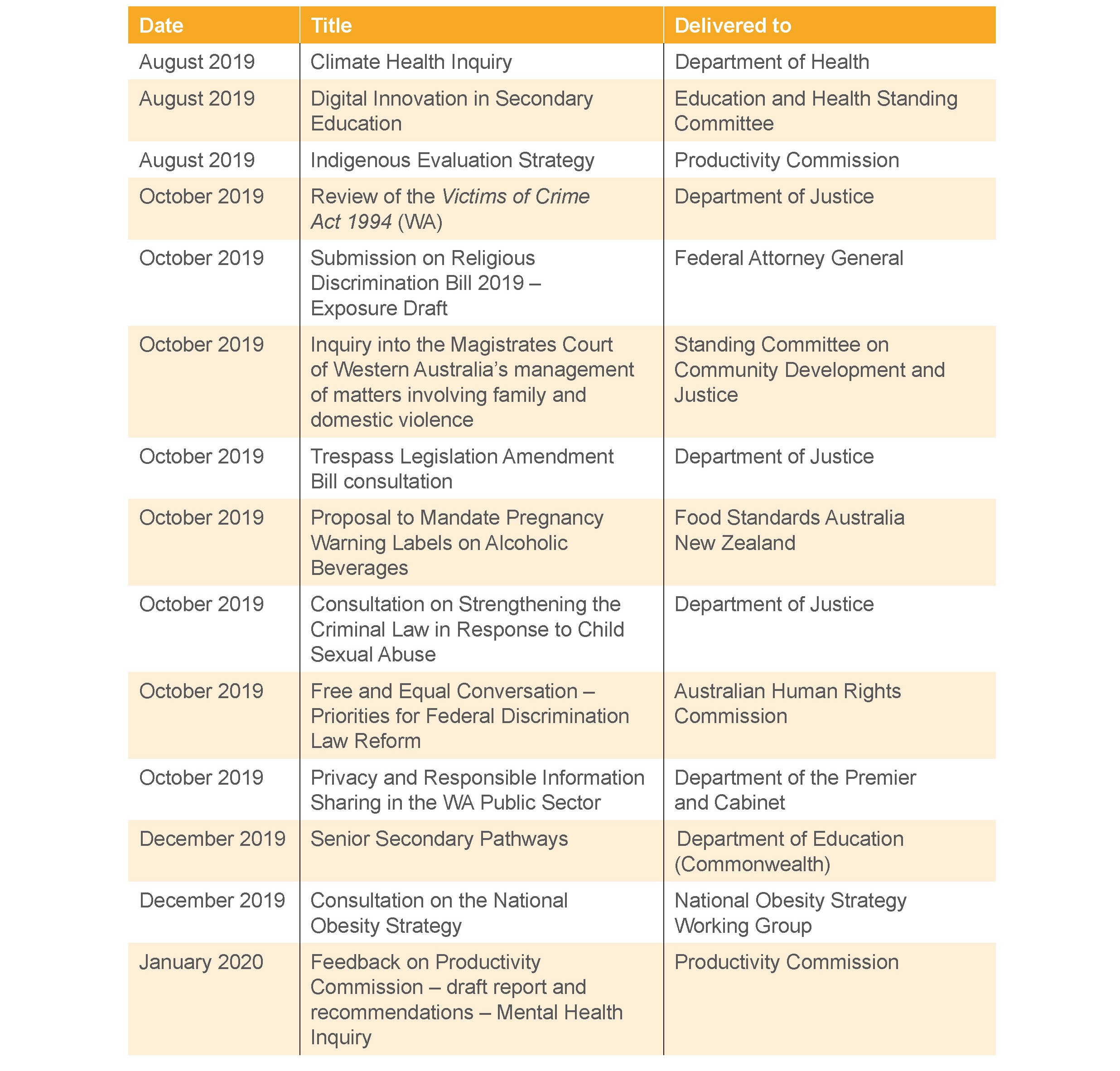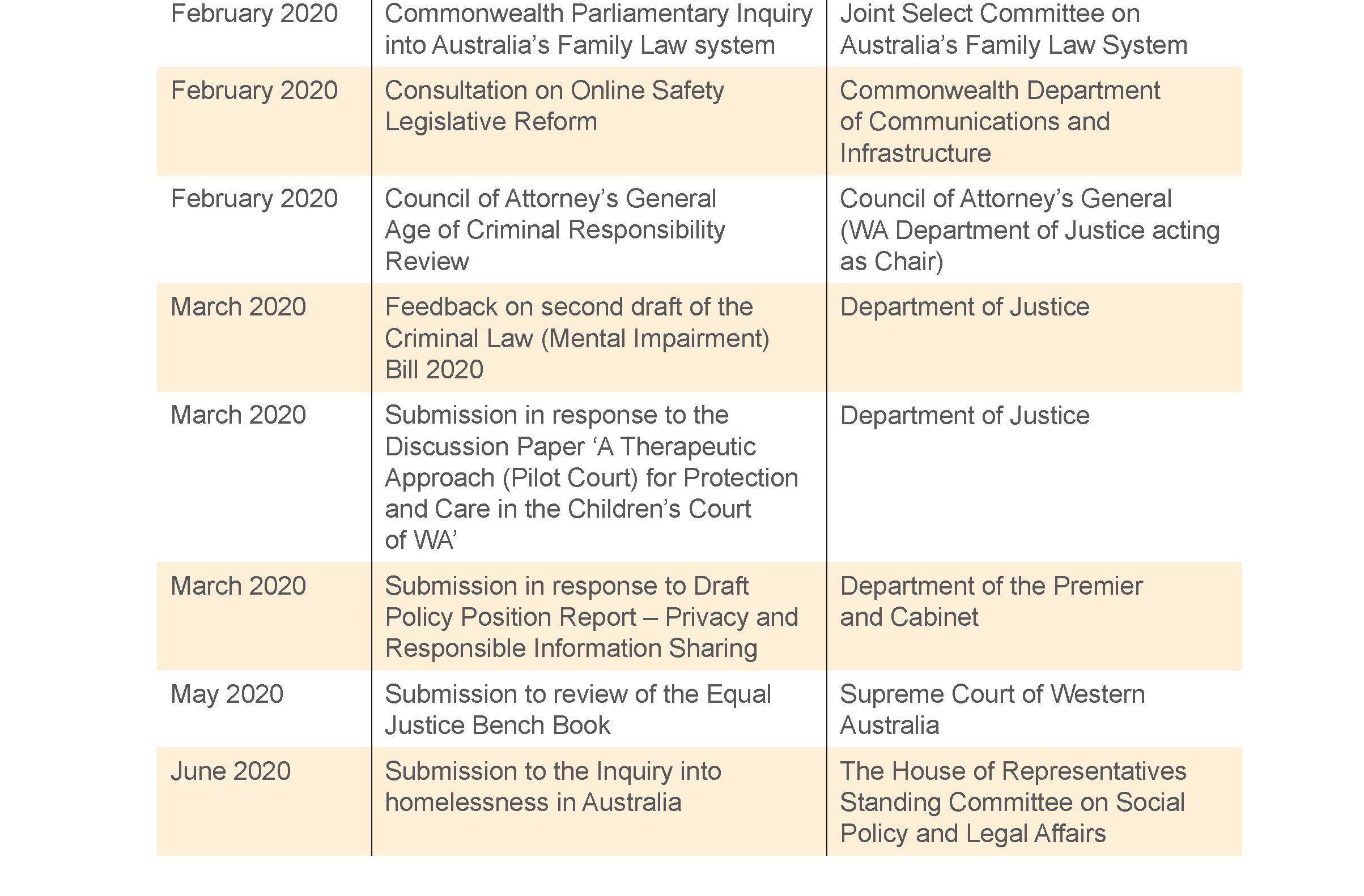Prioritising the needs of disadvantaged and vulnerable children and young people
A strong society is one that ensures its most vulnerable are provided with opportunities to contribute to that society.
Ensuring the state’s laws and policies actively support children and young people’s wellbeing and respect their role as citizens sets the broader agenda for the community. Assisting agencies to continually improve the opportunities and services for children and young people who present as vulnerable, disadvantaged or face additional inequities is an essential role of the office.
Major achievements in 2019−20
Ongoing advocacy: Vulnerable children and young people
The Commissioner continues to advocate for vulnerable WA children and young people and focus on addressing child poverty.
The Commissioner’s 2019 report Improving the odds for WA’s vulnerable children and young people outlined clear recommendations for government and actions the Commissioner’s office will undertake to improve outcomes.
At a state level, the Commissioner is working with government to develop a Child Wellbeing Strategy, incorporating a resourced implementation framework underpinned by a robust process of child impact assessment.
The Commissioner’s Child Impact Assessment Guidelines were released in July 2020 and widely distributed to organisations throughout WA. The guidelines can be used by government agencies and other organisations to ensure potential impacts on children and young people are carefully considered early in policy development or other processes.
At a national level, the Commissioner strongly advocates for the need to develop a Child Poverty Reduction Bill. The purpose of the bill is to achieve a sustained reduction in child poverty, hold governments to account against published reduction targets and provide transparent reporting on child poverty. This is being progressed with Commissioners and Guardians across Australia.
Child protection
The Commissioner chairs the Responses to Child Sexual Abuse in Western Australia Executive Steering Group, a consortium of Director Generals of government agencies, the Australian Centre for Child Protection and non-government agencies. The group focuses on strategic, cross-government opportunities to improve responses to child sexual abuse, combining research, workforce development and therapeutic interventions.
In February, Lotterywest provided an establishment grant to fund the development of a centre of excellence in responding to child abuse and neglect.
The National Foster Care and Kinship Care Conference was held in Perth in February. The Commissioner presented at the conference and has since chaired the Foster Care Refresh Project Roundtable for the Department of Communities. The Refresh project aims to improve support for foster carers.
The Commissioner continues to have strategic meetings with the Department of Communities, which is responsible for the provision of family support, child protection and out-of-home care services for children and families in WA. He also continues to advocate for strong independent oversight of the child protection system, as recommended by the Royal Commission into Institutional Responses to Child Sexual Abuse in 2017.
Breaking the cycle – Taking action
Following an Aboriginal forum held in 2018 as part of the Vulnerability Speaker Series, the Commissioner continues to support Aboriginal communities to develop solutions to the issues, barriers and challenges impacting on the wellbeing of Aboriginal children and young people.
The Commissioner recognises that Aboriginal people are best placed to identify, develop and manage solutions to meet their needs.
During the year, the Commissioner commenced working with the Wyndham Youth Aboriginal Corporation, as well as continuing to work, through local service providers, with an extended Safety Bay family group. The focus was on:
- acknowledging and understanding the impact of colonisation and resultant intergenerational trauma on the lives of Aboriginal peoples
- facilitating the engagement of children, young people and their families in identifying and addressing the needs of the children and young people in their community
- supporting Aboriginal communities to lead the planning, development, implementation, monitoring and evaluation of programs and services that provide better outcomes for their children and young people.
Harmful sexual behaviours
The Commissioner continued to support a strategic, cross-government approach to build understanding of preventative and treatment approaches for harmful sexual behaviours of children and young people.
Appearing before the hearing for the Inquiry into children and young people on the Sex Offenders Register in August 2019, the Commissioner outlined how placing young people on the register can impact their lives and his position on the automatic registration of juvenile offenders. The Commissioner’s points were cited in the Inquiry’s report which was tabled in Parliament.
The Commissioner sponsored Aboriginal counsellors and leaders from WA to participate in the 2019 Australian and New Zealand Association for the Treatment of Sexual Abuse (ANZATSA) conference. The participants met with the Commissioner throughout the year to provide insight and advice about children and young people and harmful sexual behaviours service issues in WA.
The Commissioner’s team assisted the ANZATSA committee in securing support from government agencies for the inaugural ANZATSA symposium on harmful sexual behaviours to be held in Perth in 2020. Due to the COVID-19 pandemic, this symposium has been rescheduled for 2021.
Royal Commission into Institutional Responses to Child Sexual Abuse
The Commissioner continues to strongly advocate that governments and leaders fully support and implement the recommendations from the Royal Commission.
The Commissioner participates in the Department of Communities External Implementation Working Group and the Department of Premier and Cabinet Independent Oversight Working Group, each of which leads the implementation of particular Royal Commission recommendations.
Throughout the year, the Commissioner supported the work of these committees and continued work in areas directly relevant to several of the Royal Commission’s recommendations: child friendly complaints mechanisms, oversight of services for children and young people, harmful sexual behaviours in children and young people, advocacy and support for children and young people who have been harmed and child safe organisations.
Youth justice
Young people’s involvement in the youth justice system is an ongoing priority and concern.
The Commissioner continues to make representations and advocate for changes to the WA youth justice system to improve the opportunities and outcomes for young people in the system and their families.
The ANZCCG continues to recommend governments raise the minimum age of criminal responsibility to at least 14 years, consistent with international standards. Currently, the age of criminal responsibility across Australia and New Zealand is 10.
In November 2019, as part of the ANZCCG, the Commissioner called on the Council of Attorneys-General to consider the views of children when reviewing whether to raise the age of criminal responsibility across Australia.
Mental health
The Commissioner’s 2019 Speaking Out Survey findings highlighted that substantial proportions of Year 7 to 12 students reported poor life satisfaction, low self-esteem, high levels of stress and the feeling they cannot cope with life’s challenges.
During the year, the Commissioner progressed several initiatives to monitor WA children and young people’s mental health and strongly advocate for improved services, supports and policies to support their wellbeing.
The review on the progress towards addressing the 12 recommendations made in the 2015 Our Children Can’t Wait Report relating to mental health was finalised.
This progress update was sent to involved agencies in April 2020, with the review to be released publically in early 2020–21.
The Commissioner also supported the Youth Mental Health Sub Network to seek the views of young people on their experiences of accessing mental health services and opportunities to reduce youth suicide. The findings were released in the Informing youth suicide prevention for Western Australia report in December 2019, which adds to the growing evidence that WA needs to change its approach to reduce youth suicide.
A mental health position paper was published in May 2020, strongly reiterating the need for WA to have a comprehensive and coordinated approach to mental health service delivery.
With the help of some children and young people, the Commissioner produced a video to let young people know where to get mental health support when they need it. The video was distributed to stakeholders and on social media.
Formal submissions 2019-20
The following is a list of major submissions in 2019–20. The list does not indicate all submissions or representations made by the Commissioner during the year.





